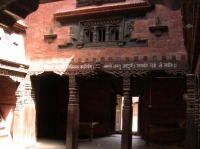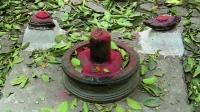Diseases of the urinary tract and kidneys are broadly classifed under the heading of “Mutravahasrota Roga”. In general, diseases of the bladder and urthera are called “Mutraghata” whereas metabolic diseases marked by polyuria (excessive urination) are typically classified under the heading of “Prameha”. Urinary diseases under the heading Mutraghata can also be classified into thirteen categories: Vatakundalika, Vatasthila, Vatavasti, Mutratita, Mutrajathara, Mutrasanga, Mutrakshaya, Mutragranthi, Usnavata, Vastikundalam, Vidvidhata, Mutrasada and Ashmari. Prameha and other kidneys disorders are discussed in the next chapter.
 The general remedies for disorders of the urinary tract are diuretics (mutravirechana), which promote the flow of urine and correct the downward flow of Vata dosha. This chapter will make frequent reference to diuretics, some of which can be chosen from this list of useful remedies:
The general remedies for disorders of the urinary tract are diuretics (mutravirechana), which promote the flow of urine and correct the downward flow of Vata dosha. This chapter will make frequent reference to diuretics, some of which can be chosen from this list of useful remedies:
- Gokshura fruit (Tribulus terrestris)
- Pashanabheda root (rockfoil / Bergenia ligulata)
- Pueraria tuber (vidari / Pueraria lobata)
- Punarnava plant/root (Boerhavia difusa)
- Shilajita Rasayana
- Shukti Bhasma (oyster shell ash /Ostrea gigas)
- Soraka (Potassium chloride)
- Yava seed (barley / Hordeum vulgare)
- Yavakshara alkaline ash (barley plant / Hordeum vulgare)
The last item on this list is Yavakshara alkaline ash, which is a very strong diuretic that is used only in minute quantities. For example, to make the mildly diuretic Guduchi stem (Tinospora cordifolia) into a strong diuretic, one gram of Yavakshara is added to 400 grams of Guduchi.
Besides diuretic remedies, a “urinary pipe enema” (uttaravasti) is also commonly used in disease of the urinary bladder. In this procedure, the enema is made with remedies that stimulate the urinary system to completely eliminate. This is given after the pre-operative procedures of pancha karma have been implemented, including oil massage and steambath, as well as laxatives to promote the passage of urine, feces and gas. One useful formula for urinary enema is a decoction made from two parts Devadaru wood (Himalayan cedar / Cedrus deodara) and one part Mustaka tuber (Cyperus rotundus), mixed with one part madhu (honey), one part Saindhavam (mineral salt) and four parts Tila seed oil (sesame / Sesamum indicum).
Medicated rectal suppositories are also used often for the same purpose of stimulating elimination. For example, a medicated suppository can be made from two parts Sarsapi seed (black mustard / Sinapis juncea), one-half part Trikatu (Piper longum, Piper nigrum, Zingiber officinalis), and one part Yavakshara alkaline ash (barley plant / Hordeum vulgare), mixed with two parts gou mutra (cow urine) and one part Matsyandika (molasses).
Mutraghata
 As a non-specific diagnosis, mutraghata is essentially synonymous with urethritis, as a “disease of the urinary pipe. It can be divided into eight categories, with the characters of Vataja, Pittaja, Kaphaja, Sannipataja, Aghantuja, Purisaja, Shukraja and Asmarija.
As a non-specific diagnosis, mutraghata is essentially synonymous with urethritis, as a “disease of the urinary pipe. It can be divided into eight categories, with the characters of Vataja, Pittaja, Kaphaja, Sannipataja, Aghantuja, Purisaja, Shukraja and Asmarija.
General Treatment
Whatever may be the cause and condition of urethritis, dysuria is always a symptom. Plenty of water must be drunk by the patient. Drinking water stimulates mucous membrane secretion for protection of the urethra and also causes a natural diuretic action.
There are some specific remedies against urethritis that can be prescribed in any condition, including:
- Gokshuradi guggulu, 2 pills twice daily
- Shitarasa vati, 2 pills twice daily
- Chandraprabha vati, 2 pills twice daily
Vataja Urethritis
Dysuria or dysuria with the character of Vata has symptoms of dryness of the urethra. It is treated with the regular Vata treatments along with diuretic remedies and urinary pipe enema made with greasy remedies. One useful remedy is a medicated oil prepared with equal parts Punarnava (Boerhavia difusa), Eranda root (Castor / Ricinus communis) and Shatavari (Asparagus racemosa) in a base of ghee or sesame oil that can be massaged over the lower pubic region.
Pittaja Urethritis
Urethritis with the character of Pitta is related to an inflamed urethra. It is treated with the regular Pitta treatments along with diuretic remedies, enema through the urinary pipe and laxative remedies. One useful intervention is a cold fomentation applied topically to pubic region, prepared with 4 parts honey, 2 parts each Amalaki fruit (Indian gooseberry / amla / Phyllanthus emblica) and Madhukam root (licorice / Glycyrrhiza glabra) and one part Devadaru wood (Himalayan cedar / Cedrus deodara), prepared with rice water or cold water.
Kaphaja Urethritis
Kapha urethritis is concerned with swelling of the urethra. It is treated with the regular Kapha treatments along with diuretic remedies and enema through the urinary pipe. Useful therapies include Pravala Bhasma (purified coral oxide), taken with cold water, or a cooled decoction of Guduchi stem (Tinospora cordifolia) taken with honey.
Sannipataja Urethritis
Urethritis with the character of Sannipata presents with complicated urinary symptoms. It is very difficult to cure, however is can be treated with symptomatic treatments based on the treatments for Vataja, Pittaja and Kaphaja urethritis.
Aghantuja Urethritis
Urethritis with the character of Aghantuja is concerned with a traumatic injury causing urethritis. It is treated with the same remedies of urethritis with the character of Vata, along with remedies such as Chandraprabha vati (2 pills twice daily) and Gokshuradi guggulu vati (2 pills twice daily).
Purisaja Urethritis
Urethritis with the character of Purisaja is related to constipation. It is treated with the regular Vata treatments and laxative remedies.
Shukraja Urethritis
Urethritis with the character of Shukraja is related to prostatitis. It is treated with the same remedies used for prostatitis.
Asmarija Urethritis
Urethritis with the character of Asmarija is caused by urinary lithiasis. It is treated with the same remedies used for urinary lithiasis.
Additional headings in this chapter*
Vatakundalika (Spasmodic Stricture Of The Bladder)
Vatasthila (Prostatitis / Neoplasm Of The Prostate Gland)
Vatavasti (Outlet Obstruction Of The Bladder)
Mutratita (Decrease In Force Of Urinary Stream)
Mutrajathara (Distended Bladder With Urine And Gas)
Mutrasanga (Anuria)
Mutrakshaya (Anuria Caused By Dehydration)
Mutragranthi (Malignant Neoplasm Of The Bladder)
Usnavata (Cystitis)
Vastikundalam (Dislocation Of The Bladder)
Vidvidhata (Pneumaturia)
Mutrasada (Crystalluria)
Ashmari (Urinary Lithiasis)
*To acquire the complete contents of “Ayurveda In Nepal: The Bajracharya Samhita” please click here.
0 Responses to “Diseases of the Urinary Bladder”